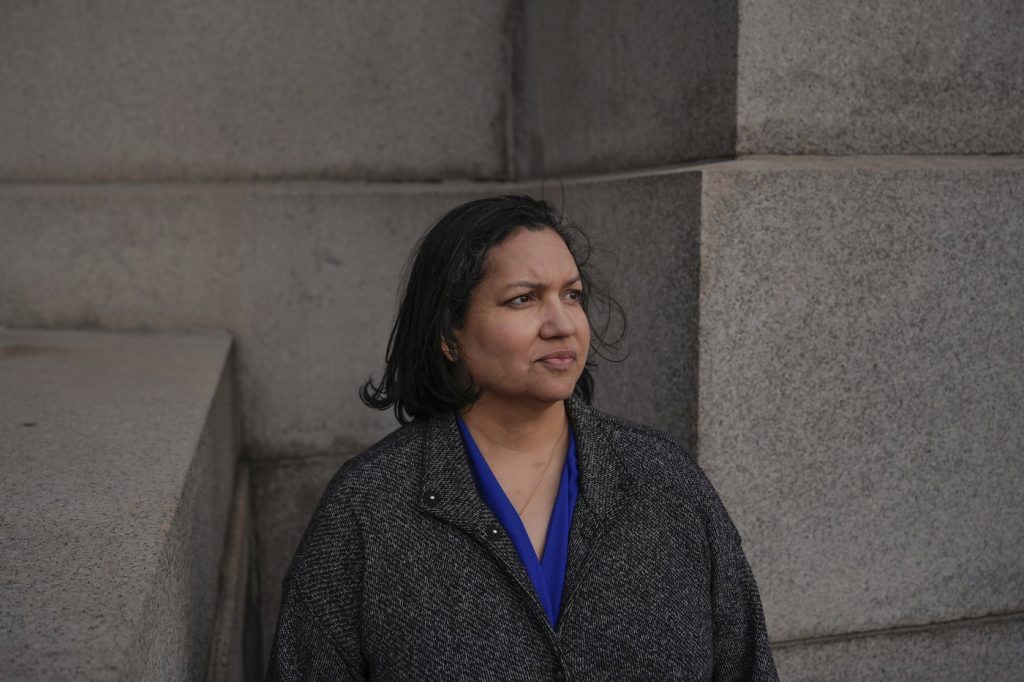NEW YORK (AP) - Administrative judge Karen Ortiz at the Equal Employment Opportunity Commission (EEOC) has recently gained attention for her outspoken stance against the directive from the current administration regarding LGBTQ+ cases. As the EEOC is responsible for enforcing U.S. workplace anti-discrimination laws, Ortiz's actions stand out amidst what has been described as tumultuous changes at the agency since President Donald Trump took office.
On January 28, Ortiz received a troubling email titled “Fork in the Road,” offering federal employees the option to resign as part of governmental cost-cutting measures led by Trump and executed under unappointed officials like Elon Musk. Alarmed by a directive from her supervisor that instructed judges to pause all LGBTQ+ cases and forward them to headquarters for review in line with Trump’s executive order recognizing only male and female genders, Ortiz took action. She criticized management's inaction in an email call to approximately 185 colleagues, urging them to resist compliance with what she termed "illegal mandates." However, she noted that her initial email was "mysteriously" deleted the following day.
Determined, Ortiz escalated her protest by directly emailing the EEOC’s acting chair, Andrea Lucas, while copying over 1,000 coworkers. The subject of her email, “A Spoon is Better than a Fork,” boldly questioned Lucas’s qualifications and suitability to serve as acting chair. In her correspondence, Ortiz expressed her commitment to uphold the law and protect the rights of all workers, particularly those who are transgender. She acknowledged the personal risks involved, emphasizing her ethical responsibility and refusal to be intimidated into silence.
Despite facing repercussions immediately after sending out her email, including a written reprimand for "discourteous conduct" and a temporary revocation of her email privileges, Ortiz’s message resonated widely. It garnered significant attention on social media platforms, receiving enthusiastic support from many colleagues and the public, who characterized her as a “freedom fighter” and an “American hero” on Reddit.
The EEOC refrained from commenting specifically on Ortiz's internal communications but cited a long-standing policy against unauthorized all-employee emails, which had been reiterated recently. Nevertheless, Ortiz remains unrepentant, highlighting that her primary intention was to advocate for her colleagues and ensure the EEOC fulfills its mission to protect workers from discrimination.
Although Ortiz has encountered challenges, including a lack of overt support from other EEOC employees due to fears of retaliation, she has received private encouragement from fellow employees and external supporters. Recognizing that many colleagues may hesitate to express their views due to concerns about job security, she advocates for collective courage to oppose policies that undermine civil rights. William Resh, a professor at the University of Southern California, noted that federal employees often face fear of potential job loss, which can stifle dissent within the workforce.
At 53, Ortiz, who has dedicated 14 years to public service, understands the risks of her actions. She has sought legal counsel and believes her stance constitutes protected whistleblower activity. Should her employment be terminated, she asserts she is prepared to find other avenues to continue her work. Her background, with roots in Puerto Rico and a strong educational foundation culminating in law degrees from Columbia and Fordham University, shapes her commitment to strive for justice and equality in the workplace.
Despite the turmoil surrounding her, Ortiz asserts that her fight for civil rights is unwavering. She hopes her actions will inspire others to speak out and stand up for their convictions, emphasizing that ethical principles should transcend organizational pressures. As she navigates this critical juncture in her career, Ortiz’s determination reflects a broader struggle within federal agencies to maintain their mission against political headwinds.











